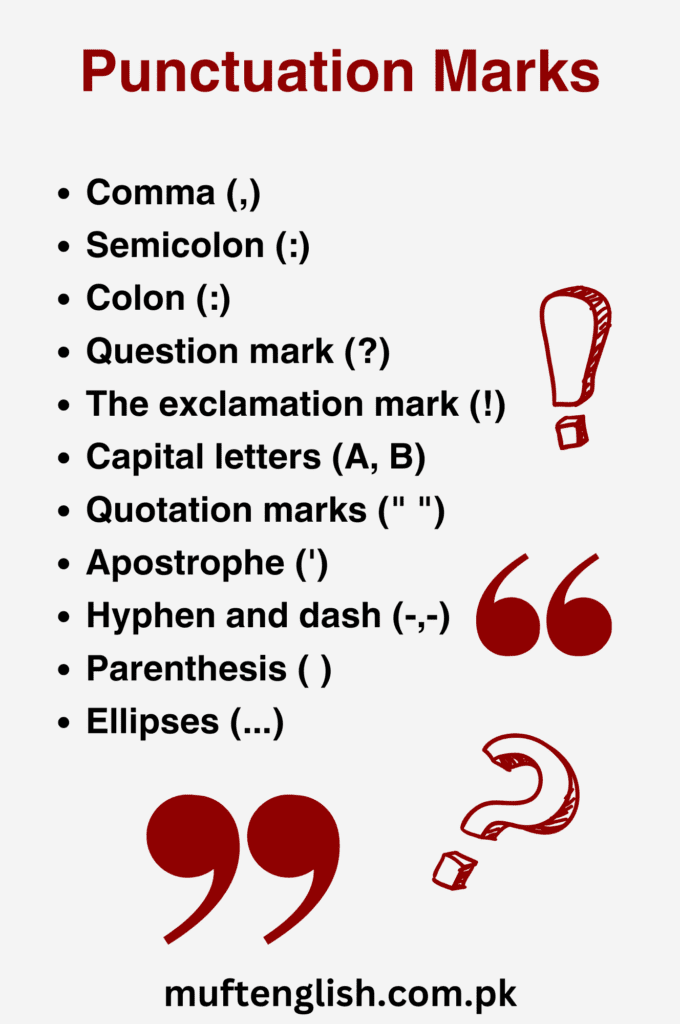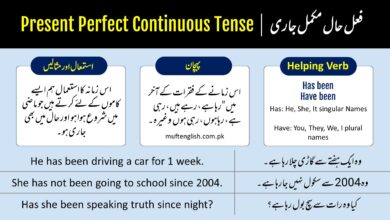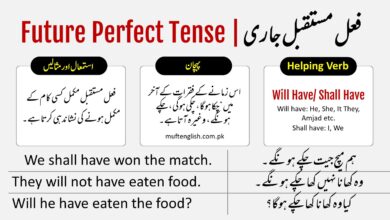Use of Punctuation Marks in English Grammar with Examples

Punctuation Marks and Uses in English Grammar
Punctuation marks are very important in English grammar it show different situations and help us know whether the sentence is affirmative or interrogative
- Comma (,)
- Semicolon (:)
- Colon (:)
- Question mark (?)
- The exclamation mark (!)
- Capital letters (A, B)
- Quotation marks (” “)
- Apostrophe (‘)
- Hyphen and dash (-,-)
- Parenthesis ( )
- Ellipses (…)
Full stop (.)
The full stop indicates the greatest pause and separation. It is used at the end of imperative and simple sentences. It can also be used in abbreviations but they are often omitted in the modern style of English. e.g.
They were playing cricket.
Wait for me.
Do not open the door.
M.A or MA / A.D or AD
Comma (.)
A comma shows the shortest pause. It is usually used:
(i) To divide the series of words in the same construction. e.g.
He is wise, intelligent, honest and brave.
I can play cricket, football and hockey.
(ii) To mark off words used in addressing people. e.g.
How are you, sir?
Ahemd, please come here.
Your marks are disappointing, my dear.
(iii) To mark off a direct quotation from the rest of the sentence.e.g.
He said, “I am busy.”
(iv) To mark off a noun or phrase in apposition. e.g.
Allama Iqbal, the great philosopher, was born in Sialkot.
v) After certain introductory words such as yes, no, well, ok, etc e.g.
Yes, I shall help you.
No, He was ill yesterday. After salutations.
vi) After salutations
Dear Ahmad. Your loving son,
vii) To set off date from the year. e.g.
Sep. 25, 2016
3rd Oct. 2016
Semicolon (:)
A semicolon indicates a pause slightly longer than a comma but shorter than a colon. It is used.
i) To connect closely related independent clauses that are not joined by coordinating conjunction. e.g.
His clothes were torn; he was late for school.
He looked at it; he hesitated; he ran away.
He tried hard, but he failed to achieve his goal.
(ii) When two clauses are joined by such words, for example. moreover, indeed, otherwise. consequently, also. therefore, accordingly etc. (conjunctive adverbs) and use a comma after these words. e.g.
He did not work; consequently, he failed. The floods damaged a lot; however, the government and the public overcame the situation.
Colon (:)
A colon marks a complete pause less than a full stop. Sometimes it is used with a dash after it (:-). It is used:
i)To introduce a list of items, especially after expressions like “as follows” and “the following”. e.g.
Please bring me: a pen, a pencil, a scale and a notebook.”
(ii) To write time mentioning the hour and the minutes. e.g.
4:30 p.m. 2:15 a.m.
iii) To introduce a quotation as: e.g. Shakespear says: Nothing is good or bad, thinking makes it so.
Question Mark (?)
A question mark is used at the end of interrogative sentences instead of the full stop.
Did he visit the office?
What do they say?
(i) Question mark is also used at the end of declarative sentence to create doubt. e.g.
The thief has been arrested?
They have passed the test?
Exclamation Mark (!)
The exclamation mark is used at the end of exclamatory sentences and after the sentences of sudden feeling, sorrows and joys. e.g.
What! a terrible fire it is.
Alas! They lost the match.
How cooperative they are!
Hurrah! We beat them up.
Capital Letters (A, B, C)
Capital letters are used:
(i) to begin a sentence;
ii) to begin each line of poetry.
(iii) to begin all proper nouns.
iv) to write a pronoun.
Quotation Marks/Inverted Commas (“”)
Inverted commas are used to close direct speech. e.g.
He said. “We have understood the tenses.” They said to us. “Did they complete it?
Apostrophe (‘)
An apostrophe is used to show the relationship and ownership of someone or something. e.g.
It is Nadeem’s pen.
This is Asif and Umair’s car.
He stays in the boy’s hostel. He is Naseem’s brother.
Hyphen And Dash (-)
A short line is used to join or divide a word. It is used to separate syllables.
i) It is used with prefixes. e.g.
Ex-President.
Anti-State.
Pro-Pakistan.
(ii) It is used to separate syllables. e.g.
Ac-tive.
Beau-ti-ful.
Com-for-ta-ble.
(iii) It is used in compound nouns. e.g.
Son-In-Law.
Ice-Cream.
Mother-In-Law
Parentheses ()
It is usually used to separate unnecessary things in a sentence. e.g.
They are happier than we (are).
He will come in (10) minutes.
They are the teachers (who/whom) we saw at the wedding party.
Ellipses (…)
An ellipse is a set of three dots (…) indicating an omission. e.g.
Today… we voted.
I cannot believe that I managed to escape alive… It was a miracle.
We all know how much importance these punctuation marks have, without punctuation marks, we cannot make a meaningful sentence. If you want to write a formal letter, application, article, or anything you must use the correct punctuation marks accordingly.





